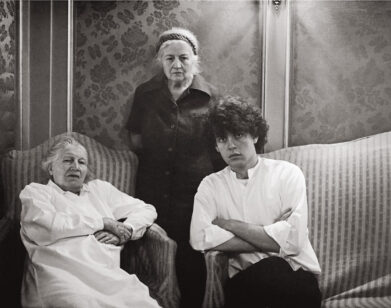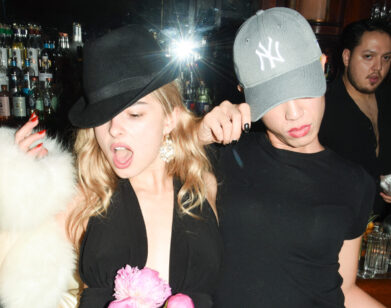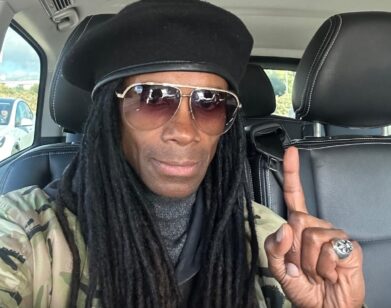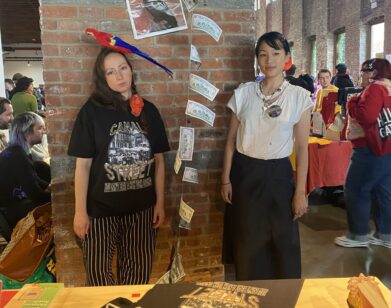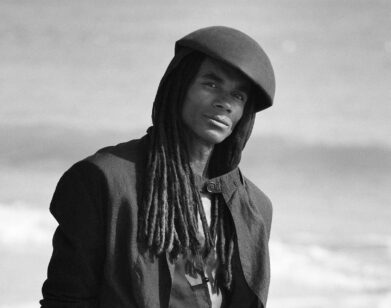History Rewrite
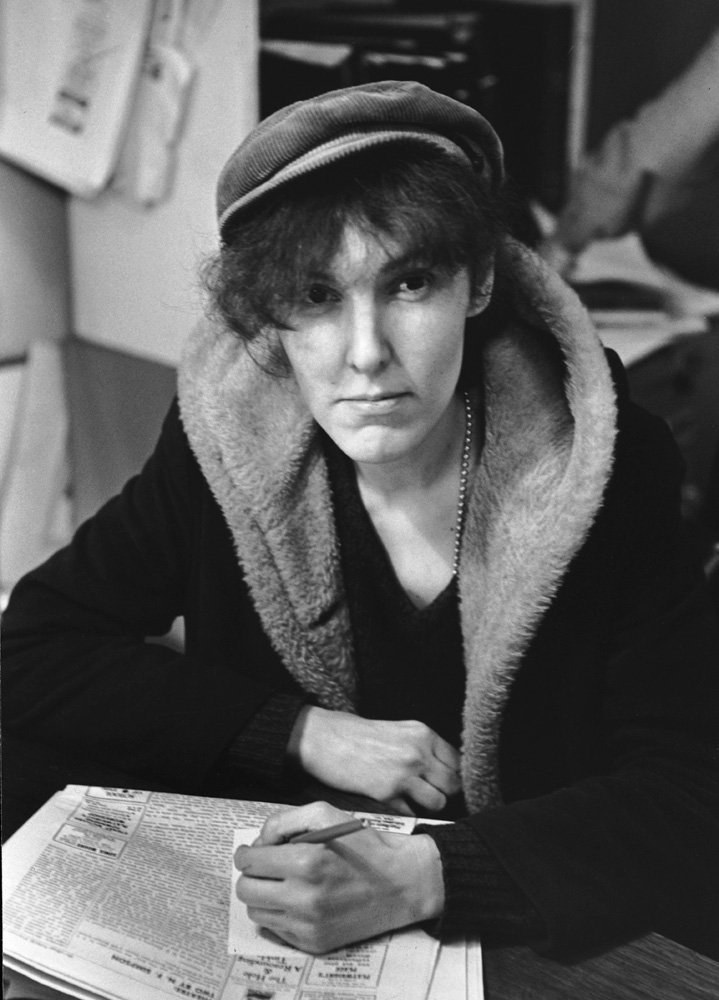
Margo Feiden is a real, old-fashioned, New York bohemian character. As youâ??ll read here, she started out as a child prodigy in Broadway theater, and then, at the age of 23, a bizarre and, until now, unrevealed event changed her life forever. She subsequently became an art dealer and is best known for representing the great caricaturist Al Hirschfeld. She called me with an amazing story to tell, and I visited her in her Greenwich Village townhouse where, over tea, she revealed a secret sheâ??s held for 40 years.
MARGO FEIDEN: The story that Iâ??m about to tell you is a terrible memoir. Thereâ??s a certain element of show-and-tell. Here I am in the Guinness Book of World Records as the youngest Broadway producer and playwright ever . . . I was 16.
GLENN Oâ??BRIEN: Oh, thatâ??s wonderful.
FEIDEN: And thatâ??s why Valerie Solanas showed up on my doorstep in Brooklyn in 1968. There was a tremendous amount of publicity at the time. I was on radio and tv. In those days there were so many newspapers, and the world of Broadway seemed to be grooming me. There basically werenâ??t any women producers. Thatâ??s why Valerie Solanas sought me out.
Oâ??BRIEN: Valerie hated men.
FEIDEN: Yes. Last night I counted on the fingers of one hand the number of people who ever knew that I had anything to do with this. All of these years I havenâ??t spoken about this, except that I went into therapy because of it, so I told the therapist. And I told my daughter because she was there. This is what happened: I came homeâ??I believe it was a Mondayâ??and, as I approached my apartment house, which was a large building in Brooklyn, I saw somebody sitting on the steps of the building. Two things struck me: She was dressed for cold weather, and this was June. I also couldnâ??t decipher her gender. I really didnâ??t know whether this was a man or a woman. But I knew that she was there to see me. I had no doubt of that, and yet I had never seen her before.
Oâ??BRIEN: Strange.
FEIDEN: It was about nine oâ??clock in the morning, and I had just come from a pediatricianâ??s appointment for my daughter. As I approached the steps, she asked me if I was Margo Feiden. And that was peculiar, because I used the name Margo Eden. In those days you had to have a stage name, and I was surprised when she asked me if I was Margo Feiden. But I wasnâ??t surprised that she was looking for meâ??I knew that she was there to see me. She said, â??Iâ??m a playwright, and I want to talk to you about a play Iâ??ve written.â? I invited her into my house. My daughter was a year and a half . . . plus five days. Valerie explained this play, this manifesto, and what she said was absolutely shocking. She had decided that the right way for society to go forward was to keep only the males who were absolutely necessary and commit genocide on the largest scale that ever could be imagined. And she said something so interesting to me . . . This was before, uh, test-tube babies . . .
Oâ??BRIEN: Yes.
FEIDEN: She said that there would come a time in our lifetimes when men would not be needed for procreationâ??that you could take the sperm and store it and you would never need males to be alive to contribute this. She said this will happen in our lifetimes. And test-tube babies . . . That concept was so . . .
Oâ??BRIEN: Science fiction?
FEIDEN: Yes. Unheard of. But she appeared so calm and thoughtful about all of this that it was clear to me that she had worked it all out.
Oâ??BRIEN: When we spoke on the phone you said that she smelled bad.
FEIDEN: Yes.
Oâ??BRIEN: Did you have no apprehension about inviting her in?
FEIDEN: No, and Iâ??ll tell you why: Itâ??s not so much that she smelled bad, but she smelled loud. I have a tremendously acute sense of smell . . . So she smelled loud.
Oâ??BRIEN: I get it.
FEIDEN: And it was a fascinating odor. And remember, she was sitting there in a winter coat . . .
Oâ??BRIEN: Yeah.
FEIDEN: I mean, Iâ??m eccentric, so this was very appealing.
Oâ??BRIEN: So she wasnâ??t scary?
FEIDEN: No. Not until toward the end, when she told me what she was about to do. Remember, stalking was not something we discussed then. Now stalking is in the newsâ??it wasnâ??t then. She had gone through all this trouble to find me. Iâ??m wondering whether it was because my cousin Bob Feiden had said something to her about me. [Bob Feiden, the late music-business executive and right hand of Clive Davis, was a friend of Warholâ??s.] I donâ??t know. But hereâ??s this interesting, eccentric woman, and it was a fascinating conversationâ??until the end.
Oâ??BRIEN: Mm-hmm . . .
FEIDEN: And she kept saying the reason she was there was because I was a woman producer. Now thatâ??s not uncommonâ??but back then it was very rare. She had this so figured out. She was so methodical, because every question that I asked her she answered without having to think. She answered it the way you might have prepared for your orals for a PhD.
Oâ??BRIEN: Interesting.
FEIDEN: It was fascinating. So I said to her, â??Valerie, Iâ??m absolutely not going to produce this play. Iâ??m not.â? And she said, â??Oh, yes you will. Youâ??ll say you will.â? And she said that with such confidence that I asked her what was it that made her so sure of this, and she said . . . [whispers, tears up] Sorry . . . [pauses] She said, â??Iâ??m going now to shoot Andy Warhol and that will make me famous, and that will make the play famous, and you will produce it. You will.â?
Oâ??BRIEN: God!
FEIDEN: And then, she had a bag made out of carpet patches, and she went into it and grabbed something and said, â??Do you know what this is?â? And I said, â??It looks like a gun.â? And she said, â??Yeah.â?
Oâ??BRIEN: Wow.
FEIDEN: My little baby daughter was asleep in that room. Valerie took the gun out, and she held it up, and she said, â??Iâ??m going to shoot AndyWarhol now, because when Iâ??m famous and when my play becomes famous, youâ??ll produce it.â? I said, â??I will not produce this under any circumstances.â? I took that chance to say that.
Oâ??BRIEN: Yeah.
FEIDEN: I didnâ??t want to add to her motive. If I hadnâ??t firmly said, â??No, Iâ??m not gonna do it,â? then I would be feeling even more guilty than I am.
Oâ??BRIEN: Yeah.
FEIDEN: And Iâ??ll tell you why I feel so guilty. I donâ??t think itâ??s logical or rational that I feel guilty . . . Once she took the gun out of this bag and held it up, she said to me, â??Iâ??m going right now to shoot him. I want you to keep the playâ??thatâ??s whatâ??s in here.â? In all these years I havenâ??t looked at the manuscript. You may find that odd. But the trauma of this . . . Well, I called Bob Feiden at Columbia Records, and I was told by his secretary that he was out, and I said, â??Can you please reach him?â?
Above: Valerie Solanas at the Village Voice offices, February 1967. Photo: Fred W. McDarrah/Getty Images.
Oâ??BRIEN: I was very good friends with Bob.
FEIDEN: He had the reputation in our family of never returning phone calls. So I said, â??This is urgent.â? But now I was facing the problem: Do I call the police and tie up the phone line? Or do I wait for him to call me back? I was frantic because I knew she meant it. There was no possibility that this woman was . . . bluffing. This was real.
Oâ??BRIEN: Yeah.
FEIDEN: I called my precinct; I called the Union Square precinct; I called the central police district, which was downtown in lower SoHo at that time; I called the mayorâ??s office . . . Most of what I got was, â??Oh, câ??mon. You think that we have nothing to do. Youâ??re making these prank calls.â?
Oâ??BRIEN: Youâ??d probably get the same thing today.
FEIDEN: Except today I wouldnâ??t do it that way. I would call somebody who knew me.
Oâ??BRIEN: The play: Was it the same one that she had been trying to get Andy to do?
FEIDEN: Um . . . I have no idea about that.
Oâ??BRIEN: That was called Up Your Ass.
FEIDEN: I donâ??t know if the play that she wanted me to produce was the same . . .
Oâ??BRIEN: What was the title?
FEIDEN: It was The Society for Cutting Up Men.
Oâ??BRIEN: Oh, so thatâ??s different.
FEIDEN: I donâ??t know. I donâ??t know if it had been titled that and the title was changed. But I will tell you this: There were three articles that I read after you and I spoke, and it was obvious to me that people think that Andy Warhol lost the play or wouldnâ??t give it back, and that was in some way mediating her horrific act.
Oâ??BRIEN: Yeah.
FEIDEN: But, in fact, she did that shooting as a publicity stunt to be famous, so that I would produce her play. Why should Andy Warholâ??s name, in any way, be sullied? Why should people think that she had any justification for what she did? He gave her none.
Oâ??BRIEN: Thatâ??s what upset me about that film, I Shot Andy Warhol [1996]. I knew the woman who made that film, and I felt that it was really unconscionable and exploitative, that it represented that she had some justification, when obviously there was none.
FEIDEN: And in one of the articles I readâ??I believe it was from the Times or The New Yorkerâ??Solanas was hailed as a pioneer in the womenâ??s movement, when in fact that had nothing to do with why she shot him. Nothing! Are you sure there was a play that she had given him and that he lost it? Are you sure of that?
Oâ??BRIEN: No. I know that it was supposed to be a play called Up Your Ass, but thatâ??s all I knowâ??
FEIDEN: But that may not be true.
Oâ??BRIEN: Itâ??s possible that itâ??s not. In any case, Valerie Solanas was defended in court by an attorney affiliated with the National Organization of Women.
FEIDEN: It wouldnâ??t surprise me, because the thought was that she was being exploited.
Oâ??BRIEN: Yeah.
FEIDEN: But, Glenn, she wasnâ??t. She killed him. Well, thatâ??s what the attempt was. Eventually it did kill him, didnâ??t it? I donâ??t think he wouldâ??ve been in the hospital if it hadnâ??t been for the damage to his internal organs.
Oâ??BRIEN: Yeah. Itâ??s possible the shooting contributed to his death later.
FEIDEN: So, when I heard the news that Andy Warhol had been shot, I almost collapsed because I couldnâ??t prevent it, and . . . Iâ??m still not over it.
Oâ??BRIEN: I can imagine.
FEIDEN: There was nothing that I did that helped. Nothing. And you know, you might think that I walked away from this horrible experience with the feeling that I would no longer let strangers into my home. But I do let strangers into my home . . . [sighs] The phobia that beset me from that moment on was that I must have at least two telephone lines.
Oâ??BRIEN: Hmm . . .
FEIDEN: I must have seven or eight lines now. There I was, not knowing whether I should make phone calls and tie up my line, because if Bob called back, that wouldâ??ve been the best thing, because he wouldâ??ve called Andy Warhol immediately.
Oâ??BRIEN: You didnâ??t know how to get in touch with Andy?
FEIDEN: No. But I knew that he and Bob were close friends.
Oâ??BRIEN: Well, the shooting changed Andy, but even after, he still let people in. Eventually there was more security. I went to work there two or three years later, and we had very loose security. It was the same place: 33 Union Square West. I went out to cash my paycheck one Friday, and I went down in the elevator, and the doors opened, and these scary-looking guys got in. I didnâ??t think about it. I went to the bank, cashed my check, and came back, and the police were there. These guys had pulled a gun and held it on Joe Dallesandroâ??s baby, and everybody gave them all the money they had. After that, we got double doors . . . [laughs] and video. And a stuffed dog.
FEIDEN: It makes me so upset that sheâ??s been championed, and that thereâ??s some belief that there was a mitigating circumstance. First of all, she was not out looking for Maurice that dayâ??I donâ??t know how to pronounce his last name . . .
Oâ??BRIEN: Girodias.
FEIDEN: I saw a documentary on Andy Warhol, and it said that Valerie was at the Chelsea Hotel on 23rd Street waiting for Girodias, and then, because she couldnâ??t find him, she went and shot Andy. There was a wisecrack in the documentaryâ??â??So Andy wasnâ??t even the first choice.â?
Oâ??BRIEN: Did you ever see Valerie Solanas again?
FEIDEN: I saw her years later walking down 8th Street, and I knew that she was in close proximity because I recognized the smell.
Oâ??BRIEN: Thatâ??s really interesting.
FEIDEN: When I smelled that smell I put my head down and made a conscious effort not to look. I was looking down, but I could see that it was Valerie. The reason that I didnâ??t come forward after he was shot is because I didnâ??t feel that it could do any good for him . . . And I didnâ??t want to be shot as well.
Oâ??BRIEN: Right.
FEIDEN: But now my feeling is, if I were to die before this gets out . . . I mean, Andy Warhol is going to be held in the same regard as a Rembrandt or a Giotto, and for the rest of time, to have people think that he stole or that somehow he was guilty . . . I canâ??t let that happen. She was a murderer! Forget whether he died or not . . .
Oâ??BRIEN: Yeah, and she shot Mario Amaya, a critic she didnâ??t even know who just happened to be there. And she tried to shoot Fred Hughes, but the gun didnâ??t go off. So she could have killed three people.FEIDEN: And so, hereâ??s the play.
Oâ??BRIEN: Can I see it?
FEIDEN: I think itâ??s almost 40 pages.
Oâ??BRIEN: Hmm . . . It starts on page 30.
FEIDEN: I know. When I took it out and opened it I saw thatâ??but I havenâ??t read it.
Oâ??BRIEN: It seems to be the original typescript. Itâ??s not a carbon copy . . . very neat typing.
FEIDEN: It is the original.
Oâ??BRIEN: Yeah, but I mean, supposedly that was the big problem with the play that Andy allegedly lostâ??there was supposedly no copy.
FEIDEN: He didnâ??t lose it, Glenn. That was all made up. Hereâ??s what I think happened: If, in fact, he had ever had some other play of hers, she wouldâ??ve said to me, â??Everybodyâ??s taking advantage of me. Iâ??m tired of being taken advantage of. Iâ??m going to shoot him.â? She didnâ??t say that to me. There was no other play. This was the play. You cannot say that Valerie was stupid. She was very conniving and very manipulative, and she didnâ??t do anything without having thought it out. Every objection to her theories, this woman had a ready answer for.
Oâ??BRIEN: Yeah.
FEIDEN: What happened is, her lawyer grabbed hold of this business of some play missing. Iâ??m sure the lawyer said, â??Wasnâ??t there anything he did to make you angry? Think about it, Valerie. Was there something he did?â?
Oâ??BRIEN: Yeah.
FEIDEN: Now, she was smart enough to know that if she gave the title of the play, I might come forward and ruin her entire defense.
Oâ??BRIEN: Mm-hmm . . .
FEIDEN: This was the play. There was no other play. This was itâ??youâ??re holding it.
Oâ??BRIEN: Thatâ??s fascinating. And thereâ??s no title page.
FEIDEN: If she was making up this ploy of Andy keeping this play, if she used this title and I came forward, her entire defense wouldâ??ve been lost.
Oâ??BRIEN: Yeah.
FEIDEN: So she was conniving enough to call it something else. You know, the way she got captured was that she walked up to a policeman in Times Square and said, â??The police are looking for me.â? She wanted to be caught. She wanted this to propel her forward. There was no other play. This is the play. That was all made up. She was a liar. Not only was she a murderer, she was a liar. I didnâ??t come forward because . . . she knew where I lived; she knew I had a baby daughter. I became very quiet. In fact, I changed my whole career. I also became very, very quiet because the police would have reason to be very upset with me.
Oâ??BRIEN: Yeah.
FEIDEN: If Iâ??d come forward and said, â??I called this precinct, this precinct, and that precinct, and the mayorâ??s office, and no one did anything . . .â?
That was a terribly frightening prospect.
Oâ??BRIEN: Valerie was on the loose. She was locked up for a little while, but when I was at the Factory a couple of years later, she would call. Vincent Fremont or I might pick up the phone, and thereâ??s Valerie. Sheâ??d ask for Andy. And at one point she called up, and Andy answered, and she said that she wanted him to get her on Johnny Carsonâ??s show, and she said, â??I could do it again.â? Thatâ??s what she wanted . . . publicity.
FEIDEN: Iâ??ve been living under a shadow of Valerie all my life. And Iâ??m still living under that shadow. I still think, Is there something I couldâ??ve done? For example, should I have said to the secretary at Bobâ??s office: â??Call Andy Warhol. This woman, Valerie Solanas, is on her way to kill himâ?? There was a reason that I didnâ??t. It doesnâ??t make me very happy to admit it, but if there had been any chance that she had changed her mind, how would that look to my family? That I called Bob and put out this level of hysterical alarm and she never showed up there.
Oâ??BRIEN: Yeah, but even if you had warned them, she couldâ??ve shown up, and they wouldnâ??t have let her in, and then she couldâ??ve come back the next day. I mean, anything could have happened.
FEIDEN: I appreciate that, because Iâ??ve been carrying this burden all my life.
Oâ??BRIEN: You did what you could.
FEIDEN: Iâ??ll never be at peace with that.
Oâ??BRIEN: Andy went on to live another 20 years, and itâ??s hard to say what he would have been like if he hadnâ??t been shot. Who knows? Maybe it had some kind of creative effect on him. He talked about how he was transformed by being shot, and nothing seemed real after thatâ??it all seemed like a big dream. So you canâ??t really think, What if?
FEIDEN: Youâ??re very kind.
Oâ??BRIEN: Iâ??m not being kindâ??maybe philosophical.
FEIDEN: A week ago I fell, and I had a concussion. Iâ??m fine now, but I thought, What if I had died? This business . . . nobody else knows it. This history would die with me, and that thought was very frightening to me. Because Andy was an artist, not just emblematic of a time, but an artist who created a time, as well.
Oâ??BRIEN: Well, I hope this alleviates your pain. In my opinion, you did everything you could. I know that one thinks, â??What if I did this? What if I did that?â? But I think that your pain is a testament to how much you cared and how much you understood.
FEIDEN: I hope he forgives me.
Oâ??BRIEN: He forgave Valerie.

